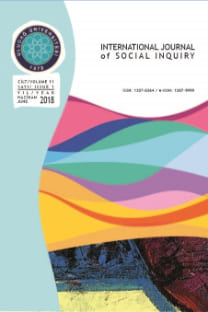Preparing Children from Disadvantaged Communities for School: Recent Australian Research
Preparing Children from Disadvantaged Communities for School: Recent Australian Research
The arguments for strategies which prepare children from disadvantaged communities for school are now clear, given research which clearly indicates such children will often commence school behind their peers, a deficit which becomes increasingly difficult to address and leads to longer term economic and social disadvantage. Various countries are attempting a range of strategies to assist these children and their families, including the HIPPY program which addresses the pre-school child’s educational disadvantage as well as assisting the parents in their role as the child’s first teacher. Australia and Turkey are amongst the countries to implement programs utilizing HIPPY principles. This paper reports on recent Australian research which demonstrates that, compared with Australian norms and a comparison group, HIPPY closes the literacy and numeracy gap between disadvantaged children and their peers by the time they enter school. Children utilizing HIPPY had fewer problems in relating to their peers. Parents felt more comfortable in their role, and their parenting style became significantly less angry or hostile. Activities jointly involving parents with their children increased, both in the home and outside in the community. School teachers reported that children who had completed HIPPY were more involved with the school and with their child’s learning than other parents, and the children were performing well at school.
___
- Brotherhood of St. Laurence, http://www.bsl.org.au/pdfs/Investing_in_our_future_HIPPY_National_Rollout_Evaluation_Final Report_2011.pdf
- Brooks-Gunn, J 2003, ‘Do you believe in magic? What we can expect from early childhood intervention programs’, Social Policy Report, vol. 17, no. 1, pp. 3-15.
- de Lemos, M. & Doig, B. 1999, Who am I? supplementary information, Melbourne: ACER.
- DEEWR – Department of Education, Employment and Workplace Relations, 2009, A snapshot of early childhood development in Australia – AEDI national report 2009, prepared by the Centre for Community Child Health and Telethon Institute for Child Health Research, Canberra: DEEWR.
- Duncan, G, Ludwig, J & Magnusson, K 2007, ‘Reducing poverty through preschool interventions’, The Future of Children, vol. 17, no. 2,pp. 143-160.
- Dunn, Lloyd M & Dunn, Leota M 1997, Peabody Picture Vocabulary Test, 3rd edn., Circle Pines Minnesota: American Guidance Service.
- Goodman, R 1997, ‘The Strengths and Difficulties Questionnaire: a research note’, Journal of Child Psychology and Psychiatry, vol. 38, pp. 581-586.
- HIPPY International 2010, http://www.hippy.org.il/evaluation.html, & http://www.hippy.org.il/recent-reports.html
- Karoly, L. 2001, ‘Investing in the future: reducing poverty through human capital investment’, in S Danzinger & R Haverman (eds), Understanding poverty, Harvard University: Harvard University Press.
- Liddell, M, Barnett, T, Hughes, J & Diallo Roost, F 2009, The home learning environment and readiness for school, prepared for the Victorian Department of Education and Early Childhood Development, Melbourne: Brotherhood of St Laurence.
- Liddell, M, Barnett, T, Diallo Roost, F & McEachran, J 2011, Investing in our future; an evaluation of the national rollout of the Home Interaction Program for Parents and Youngsters (HIPPY), final report to the Department of Education, Employment and Workplace Relations, Melbourne: Brotherhood of St. Laurence.
- OECD – Organisation for Economic Co-operation and Development 2011, Doing Better for Families, Paris: OECD.
- Sutton, C, Utting, D, & Farrington, D (eds) 2004, Support from the start: working with young children and their families to reduce the risk of crime and anti- social behaviour, Research Report 524, Nottingham, UK: Department for Education and Skills, DIES Publications.
- Wise, S, da Silva, L, Webster, E & Sanson, A 2005, The efficacy of early childhood interventions,report prepred for the Australian Government Department of Family and Community Services, Melbourne: Australian Institute of Family Studies.
- Zubrick, SR, Smith, GJ, Nicholson, JM, Sanson, AV, Jackiewicz, TA & LSAC Research Consortium 2006, Parenting and families in Australia, Canberra: Department of Families, Community Services and Indigenous Affairs.
- ISSN: 1307-8364
- Yayın Aralığı: Yılda 2 Sayı
- Başlangıç: 2008
- Yayıncı: BURSA ULUDAĞ ÜNİVERSİTESİ > SOSYAL BİLİMLER ENSTİTÜSÜ
Sayıdaki Diğer Makaleler
Religion and Politics In A Sociological Perspective: A Comparison Between the Usa and France
Preparing Children from Disadvantaged Communities for School: Recent Australian Research
The Role of Political Youth Movements in the Democratisation Process of the Contemporary Russia
The Convergence or Divergence of Pilgrimage and Tourism in Modern China
Polygamy in the Ottoman City of Bursa
Barbied Dreams, Barbied Lives: On our backs, in the attics of our memories, on the shelves
